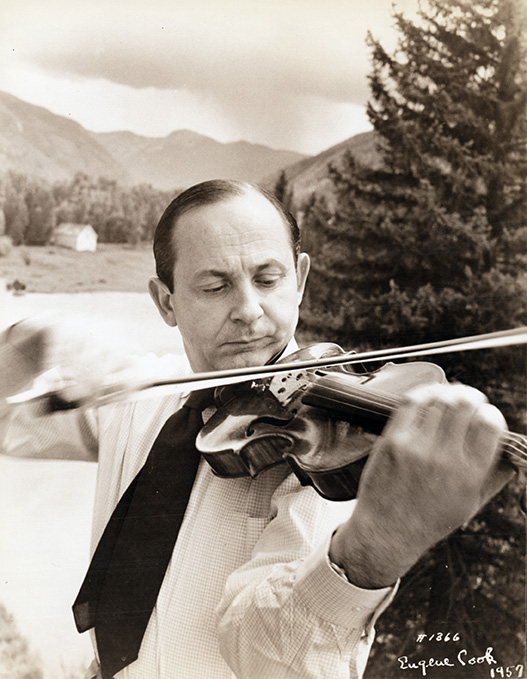
E
ven though his life was full of struggle, Goldberg never forgot to have a smile on his face and always extended his gentle manners towards every encounter. A man of few words, silently embracing with warmth, his presence resembled his music in its unbreakable elegance.
A
s he fled from the Second World War, through Australia to America, he stopped at the island of Java, then under Dutch rule, to give a number of concerts. There he became a prisoner of the Japanese army and was forced to spend two and a half years in a concentration camp. After he left, stories continued to be told amongst the prisoners, of Goldberg and his gracefulness, which uplifted people faced with fading dignity, in the harsh conditions of the camp. One of the stories was written by a Dutch scientist after hearing of Goldberg's death, and was subsequently published in a newspaper:
"I was ten years old when I was put in the same concentration camp as Mr Goldberg. He performed Bach's solo Sonata for us, and I listened crouching right next to him on the floor, so closely that my face almost touched his knees. This was the moment I learned of the existence of such pure beauty. I decided to learn the instrument myself after this experience, and now my son and my grandson enjoy the violin too. When the conditions in the camp worsened, and we were no longer allowed music, I still clearly remember him walking with a little stick in his hand practicing, moving his fingers and wrist beautifully during forced labour. I also remember how his clear eyes were full of warmth. Through knowing Mr Goldberg, I learned of the most important things we must pass on."
T
he war took many things away from Goldberg, but he was not someone who blamed his surroundings. Such questions like, why was he born in such a difficult time, were meaningless for him. For Goldberg, his life's work was to enrich each day to the next. Difficult pasts remained as experiences, without the need for obsession. His enquiring mind never faded, it was his passion and inner strength which supported his being, together with his extremely clear senses, and strong instincts capturing the essence of things. Goldberg's main interest and joy was to broaden his knowledge, not only in the field of music, but also in all other kinds of wisdom. He studied passionately to understand human life and music in as much depth as possible.
When the war finally came to an end, Goldberg and his wife Maria, who had been separated without knowing what had become of one another, found each other. And his violin, which had been miraculously hidden and saved by many different people, was also awaiting him.
F
ollowing the war, Goldberg spent one year in Australia to rehabilitate, and then started his career again from Autumn of 1947. His postwar career began in Holland, and expanded throughout all of Europe, North America, Canada, South America and South Africa. However, he never set foot in Germany again. Even though Germany was a defeated country, West Germany's early success in the recording industry made it an important place for musicians. Despite this, and despite Goldberg's tolerant principles, he declined any invitation from this once-invasive country with fortitude. This was the one principle which Goldberg was unable to compromise on
In 1955, Goldberg founded the Netherlands Chamber Orchestra at the request of the Dutch government. He worked there as a violinist, music director and as a conductor for 22 years performing over three thousand pieces. His music always enchanted the audience, radiating with individual colours, high intensity and strength. His music, like his mind, does not belong to a certain category. It is not a creation of history, or an idea affected by a certain -ism. Behind Goldberg's strict thinking and outstanding ability to make the right choices, was the extraordinary amount of time to study which he eagerly reserved. He did not possess the practicality of using his life-time effort for success or fame. Instead he believed in studying and serving his true purpose, pursuing a higher understanding of music. He knew that the joy of studying is the sense of fulfilment coming from learning with quality, and that the work itself is the only reward required.
H
e was married to his wife Maria for 55 years. She was seven years older than him. When Maria's health declined, Goldberg gave up his performing career to nurse her, but still continued studying and learning. In the days I spent with Goldberg, he passionately enjoyed finding something new in the pieces he already knew so well, and dedicated all his time to this pursuit. Uninterested in worldly values, and being aloof from mundane affairs, it was this joy and interest which satisfied him.
Until the end, Goldberg was true to his ideals towards music and life, giving him a gentle certainty of attitude and spirit. He was always fresh in his demeanour, and his character displayed humour, warmth and nobility.
I imagine, the faint halo which always surrounded him is still there, far beyond the sky.
